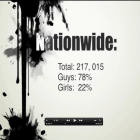

Supreme Court Gives Juveniles Protection in Police Interrogations
|
[This article was reprinted with permission from YouthToday]The U.S. Supreme Court ruled today in a 5-4 decision that said a police officer must take a child’s age into consideration when determining whether to issue a Miranda warning to a juvenile suspect. The case, J.D.B.v. North Carolina is the latest in a string of cases in which the high court has applied protection to certain groups of juveniles. The court banned the juvenile death penalty in the 2005 Roper v. Simmons case, and last year ruled in Graham v. Florida that life without parole sentences were unconstitutional for juveniles convicted of any crime other than homicide. “This represents the court’s settled commitment to its view that kids are different,” said Marsha Levick, deputy director and co-founder of the Philadelphia-based Juvenile Law Center. “It’s just a further shoring up of that direction they’ve been moving in for last several years.”
Justice Sonia Sotomayor, writing for the majority, said, “So long as the child’s age was known to the officer, or would have been objectively apparent to a reasonable officer,” law enforcement and the courts must factor age into a decision to give a Miranda warning to a juvenile suspect.

Helping Kids with Substance Abuse Grant
|
The Substance Abuse and Mental Health Services Administration’s Center for Mental Health Services is offering grants for Expansion of the Comprehensive Community Mental Health Services for Children and their Families. The grants' purpose is development of a comprehensive strategic plan to improve and expand services provided by systems of care for kids. These systems will address substance abuse problems, serious emotional disturbances and families undergoing this pressure. The aim of this grant is to help reduce suicide attempts, enhance contact with police and to improve school attendance. The deadline for this grant is June 2, 2011.

Traumatic Stress Grant
|
Substance Abuse and Mental Health Services Administration, Center for Mental Health Services announces a one-year grant to continue and expand grant activities funded under the National Child Traumatic Stress Initiative, Treatment and Service Adaption Centers, Category II and Community Treatment and Services Centers – Category III. This grant is to increase activity and services of the nation's child welfare system, juvenile justice/dependency court systems as well as to fund child mental health systems. The goal is to create a national network of grantees known as the National Child Traumatic Stress Network (NCTSN) that works to develop and promote effective trauma treatment, services and other resources, such as child-serving community service systems, for kids exposed to trauma. The deadline for this is June 3, 2011.

Mentoring Program Grant
|
The MetLife Foundation grant continues its tradition of community involvement through its After-School and Mentoring Grant. This is to help increase opportunities for kids through after-school programs and mentoring kids through organizations that help enrich out-of-school activities for low-income middle school kids.

Census of Kids on Probation
|
The latest census by the Office of Juvenile Justice and Delinquency Prevention offers insight into the number of kids nationwide and in the south who are on probation for various crimes. The number of kids in the southern states make up more than a fourth of the crimes. The southern states include: Alabama, Arkansas, Delaware, Florida, Georgia, Kentucky, Louisiana, Maryland, Mississippi, North Carolina, Oklahoma, South Carolina, Tennessee, Texas, Virginia, West Virginia as well as the District of Columbia.

Grant To Support Kids Wanting to go to College
|
The Lumina Foundation supports programs that benefit access to and help prepare kids for college. The goal is to focus on underserved populations, such as low-income students. Lumina’s goal is to increase the rate of those in higher education rate in the United States to 60 percent. While the mission of the Lumina foundation is for access and success, the emphasis is on attainment of a degree.

Grant Aims to Keep Kids Out of Trouble Through the Arts
|
Target is offering a grant to bring the arts into the schools. Music, art, dance, drama and visual arts are all part of the well-rounded education for kids. This helps expand creativity and horizons and could even help keep kids out of trouble. The grants are worth $2,000 and are accepted between March 1 and April 30, 2011.

Grant to Help Kids Read
|
Target is offering a grant to help nurture the love of reading and build strong families. This grant supports, schools, libraries and nonprofit organizations. These grants are worth $2,000 and are accepted between March 1 and April 30.

Grants to Improve State Courts
|
Grants that improve the administration of state courts are offered in the State Justice Institute (SJI) Grants. SJI was established in 1984 to improve the quality of justice in state courts and to help improve the coordination between state and federal courts. The goal of this grant is to come up with innovative and efficient solutions to common issues that all courts face. SJI offers grants for projects, technical assistance, and curriculum adaption, partner, strategic innitiatives and training grants. The Deadline for all of these grants is May 1, 2011.